Just In
- 3 hrs ago

- 4 hrs ago

- 9 hrs ago

- 12 hrs ago

Don't Miss
- Finance
 Results, Dividend, Fundraise On April24: Buy Top Bank Stock Amid Rich Valuation, TP Rs 1400: Nomura
Results, Dividend, Fundraise On April24: Buy Top Bank Stock Amid Rich Valuation, TP Rs 1400: Nomura - Sports
 Who Won Yesterday's IPL Match 33? PBKS vs MI, IPL 2024 on April 17: Mumbai Indians Escape Last-Ditched Fight by Punjab Kings To Win
Who Won Yesterday's IPL Match 33? PBKS vs MI, IPL 2024 on April 17: Mumbai Indians Escape Last-Ditched Fight by Punjab Kings To Win - Movies
 Do Aur Do Pyaar OTT Release Date & Platform: When & Where To Watch Vidya Balan’s Film After Theatrical Run?
Do Aur Do Pyaar OTT Release Date & Platform: When & Where To Watch Vidya Balan’s Film After Theatrical Run? - News
 BRS Chief K Chandrasekhar Rao Slams BJP, Says K Kavitha's Arrest Is Vendetta Politics
BRS Chief K Chandrasekhar Rao Slams BJP, Says K Kavitha's Arrest Is Vendetta Politics - Automobiles
 Aprilia RS 457 Accessories: A Detailed Look At The Prices
Aprilia RS 457 Accessories: A Detailed Look At The Prices - Education
 Karnataka SSLC Result 2024 Soon, Know How to Check Through Website, SMS and Digilocker
Karnataka SSLC Result 2024 Soon, Know How to Check Through Website, SMS and Digilocker - Technology
 Nothing Ear, Ear a With ANC, Up to 42.5 Hours of Battery Launched; Check Price and Availability
Nothing Ear, Ear a With ANC, Up to 42.5 Hours of Battery Launched; Check Price and Availability - Travel
Telangana's Waterfall: A Serene Escape Into Nature's Marvels
How To Cure Your Cough: Ginger, Honey And Lemon Home Remedy
If you have been suffering from cough, you might be taking over the counter medications that have undesirable side effects like nervousness, nausea and drowsiness. So, why not go with a natural home remedy like honey, ginger and lemon for curing cough?
Cough is a common voluntary and involuntary action that clears the throat off the mucous and foreign irritants. Coughing the throat clearly is a voluntary action, although there are a number of conditions that can cause cough.
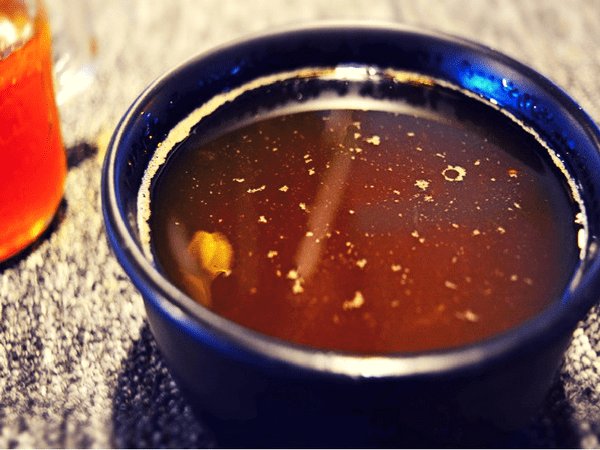
Generally, a cough that lasts between 3 and 8 weeks is a subacute cough and a persistent cough that lasts for more than 8 weeks is a chronic cough.
What Are The Causes Of Cough
- Bacteria and virus
- Smoking
- Asthma
- Medicines
- Other conditions
How To Treat Cough With Ginger, Honey And Lemon
Ginger, honey and lemon can be used to prepare a cough syrup instead of going for the over-the-counter medications. This combination has been used as a traditional home remedy for treating coughs and has earned a fair reputation in the medical community as well.
Each of these ingredients has its own potent properties to treat cough and when used in combination, the benefits double.
What Are The Properties Of Ginger
Ginger contain chemical compounds such as gingerols, zingerone and shogaol which have medicinal qualities that can actually reduce your cough. The spice is also often used to soothe sore throats and reduce coughing due to its natural analgesic properties.[1] Ginger has medicinal components which include essential oils, antioxidants and oleoresin [2] . Oleoresin is known for its antitussive abilities, which means it can relieve and suppress cough.
What Are The Properties Of Honey
Honey has antibacterial properties that help in eliminating the cough causing bacteria [4] . That's the reason why honey is considered a very good medicine to relieve cough more effectively than the over-the-counter medicines that contain dextromethorphan, a cough suppressant[5] .
What Are The Properties Of Lemon
Lemon is a citrus fruit which is packed full of vitamin C which strengthens your immunity and keeps cold and cough at bay. Lemons have strong antibiotic, antibacterial and antiviral properties that can ward away the bacteria and virus causing cough [3] .
When all the three ingredients are combined together, the effect increases as ginger, lemon and honey stimulate the salivary glands and triggers the release of mucous through the airways. This remedy reduces the mucous as well as the antimicrobial and antioxidant effect of honey inhibits the formation of mucous, thereby bringing relief from coughing. It loosens the mucous, soothes the irritating throat and clears the passage ways.
How To Make Ginger, Honey And Lemon For Cough
Ingredients
- 1 cup honey
- 2 lemons
- 2.5 inch ginger
- 1 cup water
Prep time: 10 minutes
Cooking time: 30 minutes
Quantity: 1 jar
Method
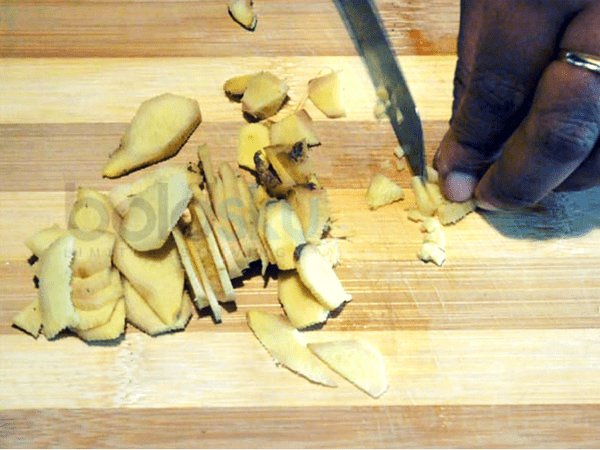
Step 1: Peel the ginger root and chop it into small pieces.
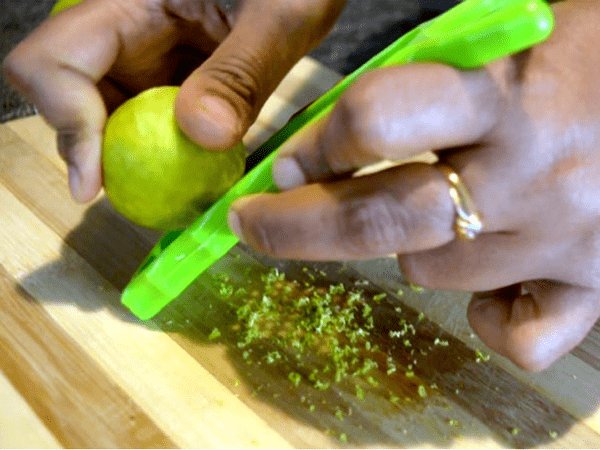
Step 2: Grate the peels of the lemon until you get 1-1.5 teaspoons of lemon zest.
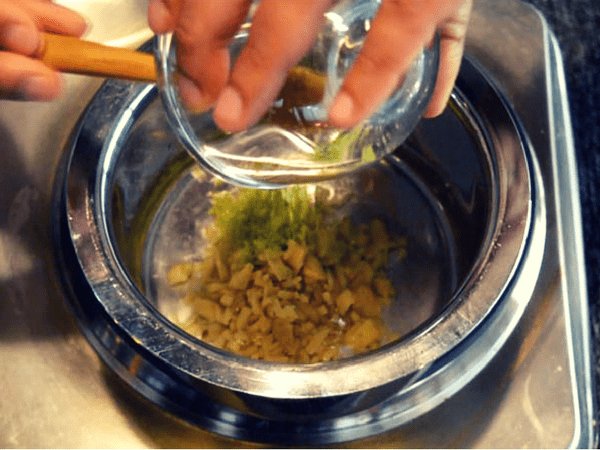
Step 3: Take a saucepan and pour 1 cup of water into it. Then, add the chopped ginger and lemon zest into the water and stir.

Step 4: Boil the liquid and let it simmer for 4-5 minutes.

Step 5: Strain the liquid into a bowl until the saucepan only contains the ginger bits and lemon zest. Keep this aside.
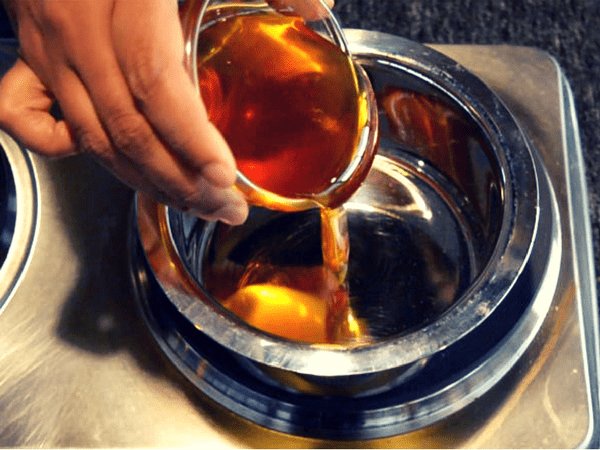
Step 6: Take another saucepan and pour 1 cup of honey into it. Allow this to heat over low flame for the next 8-10 minutes.
Caution: Make sure the honey does not boil, as that will destroy its medicinal properties.
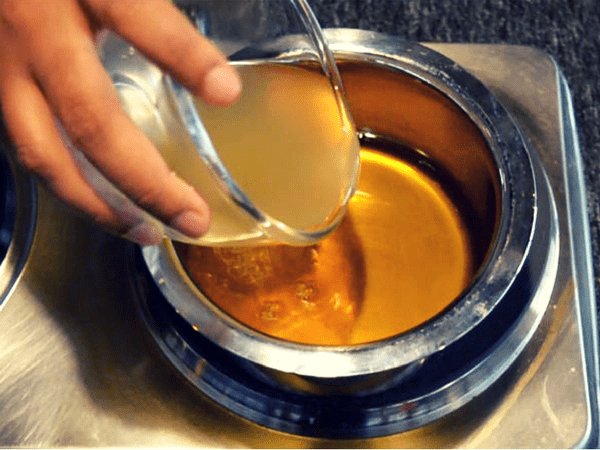
Step 7: Once the honey is hot, pour the previously prepared lemon zest and ginger liquid into it. Then, squeeze out the juice of the 2 lemons and pour it into this mixture. Mix everything well.
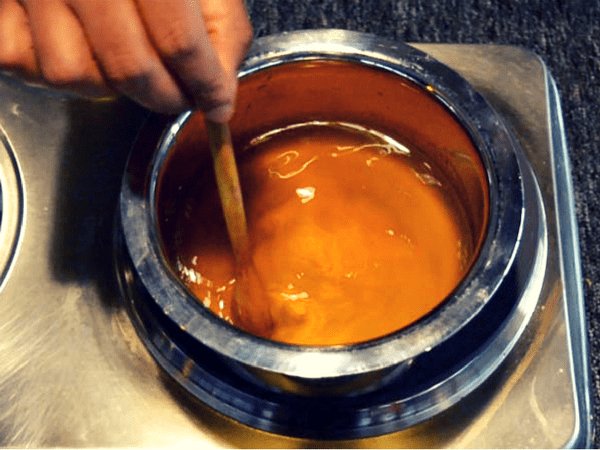
Step 8: Over a low-medium flame, keep stirring this mixture for the next 10 minutes, until the liquid starts to bubble and boil.
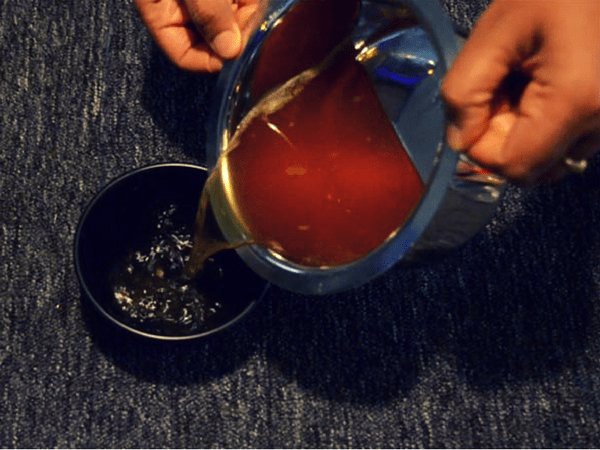
Step 9: Once the mixture has boiled over, take it off the flame and allow it to cool, until it is just warm to touch. Then, pour it into a glass jar.
Caution: Don't pour hot syrup into a glass container, as that can cause it to crack and shatter. And don't store this syrup in a plastic container.
Storage instructions: Keep it in a cool, dry, and hygienic place, out of direct sunlight, in an air-tight glass container.
Expiry: Use within 3 weeks.
Instructions
for
use
- Warm up one teaspoon of the syrup before consuming it.
- Don't drink water for the next half an hour.
- Have this syrup three times in a day for at least 3 days to see visible effects.
Who Can Consume Ginger, Honey And Lemon For Cough?
Adults and teenagers both can have this concoction as it's completely safe. For pregnant women and babies, it's better to consult a doctor before having the ginger, honey and lemon drink.
- [1] Sepahvand, R., Esmaeili-Mahani, S., Arzi, A., Rasoulian, B., & Abbasnejad, M. (2010). Ginger (Zingiber officinale Roscoe) Elicits Antinociceptive Properties and Potentiates Morphine-Induced Analgesia in the Rat Radiant Heat Tail-Flick Test. Journal of Medicinal Food, 13(6), 1397–1401.
- [2] Bellik, Y. (2014). Total antioxidant activity and antimicrobial potency of the essential oil and oleoresin of Zingiber officinale Roscoe. Asian Pacific Journal of Tropical Disease, 4(1), 40–44.
- [3] Nasser AL-Jabri, N., & Hossain, M. A. (2014). Comparative chemical composition and antimicrobial activity study of essential oils from two imported lemon fruits samples against pathogenic bacteria. Beni-Suef University Journal of Basic and Applied Sciences, 3(4), 247–253.
- [4] Mandal, M. D., & Mandal, S. (2011). Honey: its medicinal property and antibacterial activity. Asian Pacific Journal of Tropical Biomedicine, 1(2), 154–160.
- [5] Paul, I. M. (2007). Effect of Honey, Dextromethorphan, and No Treatment on Nocturnal Cough and Sleep Quality for Coughing Children and Their Parents. Archives of Pediatrics & Adolescent Medicine, 161(12), 1140.
-
 healthExclusive: Expert Shares Impact of Heat Waves on Infectious Disease Transmission
healthExclusive: Expert Shares Impact of Heat Waves on Infectious Disease Transmission -
 healthExclusive: Doctor Shares Why Women Should Prioritize Health, Key Resolutions For Well-being And Vitality
healthExclusive: Doctor Shares Why Women Should Prioritize Health, Key Resolutions For Well-being And Vitality -
 healthEverything You Need To Know About Deadly H5N1 Virus That Can Be 100 Times Worse That COVID-19 Pandemic
healthEverything You Need To Know About Deadly H5N1 Virus That Can Be 100 Times Worse That COVID-19 Pandemic -
 astrologyWorld Health Day 2024: Holistic Health Tips For 12 Zodiac Signs As Per Astrology
astrologyWorld Health Day 2024: Holistic Health Tips For 12 Zodiac Signs As Per Astrology -
 healthInstagram Claims Grapes Are Contaminated With Pesticides, Methods To Clean It Properly Before Consuming Them
healthInstagram Claims Grapes Are Contaminated With Pesticides, Methods To Clean It Properly Before Consuming Them -
 healthDutch Woman Opts For Euthanasia In May Not Due To Physical Illness, Know How To Build Mental Resiliance
healthDutch Woman Opts For Euthanasia In May Not Due To Physical Illness, Know How To Build Mental Resiliance -
 health20-Year-Old Man In China Suffers From Delusional Love Disorder, Know What Is Erotomania And Its Signs
health20-Year-Old Man In China Suffers From Delusional Love Disorder, Know What Is Erotomania And Its Signs -
 healthExclusive: On World Autism Day 2024, Let Us Empower Parents With Positive Strategies For Autism Care
healthExclusive: On World Autism Day 2024, Let Us Empower Parents With Positive Strategies For Autism Care -
 health10 Year Old Girl Dies After Eating Cake, How To Identify A Bad Cake Online, What Health Risks It Can Pose
health10 Year Old Girl Dies After Eating Cake, How To Identify A Bad Cake Online, What Health Risks It Can Pose -
 healthLove To Cuddle? These Are The 10 Amazing Health Benefits Of Cuddling Which Will Make You Want It More
healthLove To Cuddle? These Are The 10 Amazing Health Benefits Of Cuddling Which Will Make You Want It More -
 astrologyApril 2024 Health Horoscope: Know How This Month Will Affect Zodiac Signs In Terms Of Wellness
astrologyApril 2024 Health Horoscope: Know How This Month Will Affect Zodiac Signs In Terms Of Wellness -
 healthWhat Is iPhone Finger? Here's Why You Need To Worry About Its Negative Effects
healthWhat Is iPhone Finger? Here's Why You Need To Worry About Its Negative Effects


 Click it and Unblock the Notifications
Click it and Unblock the Notifications



